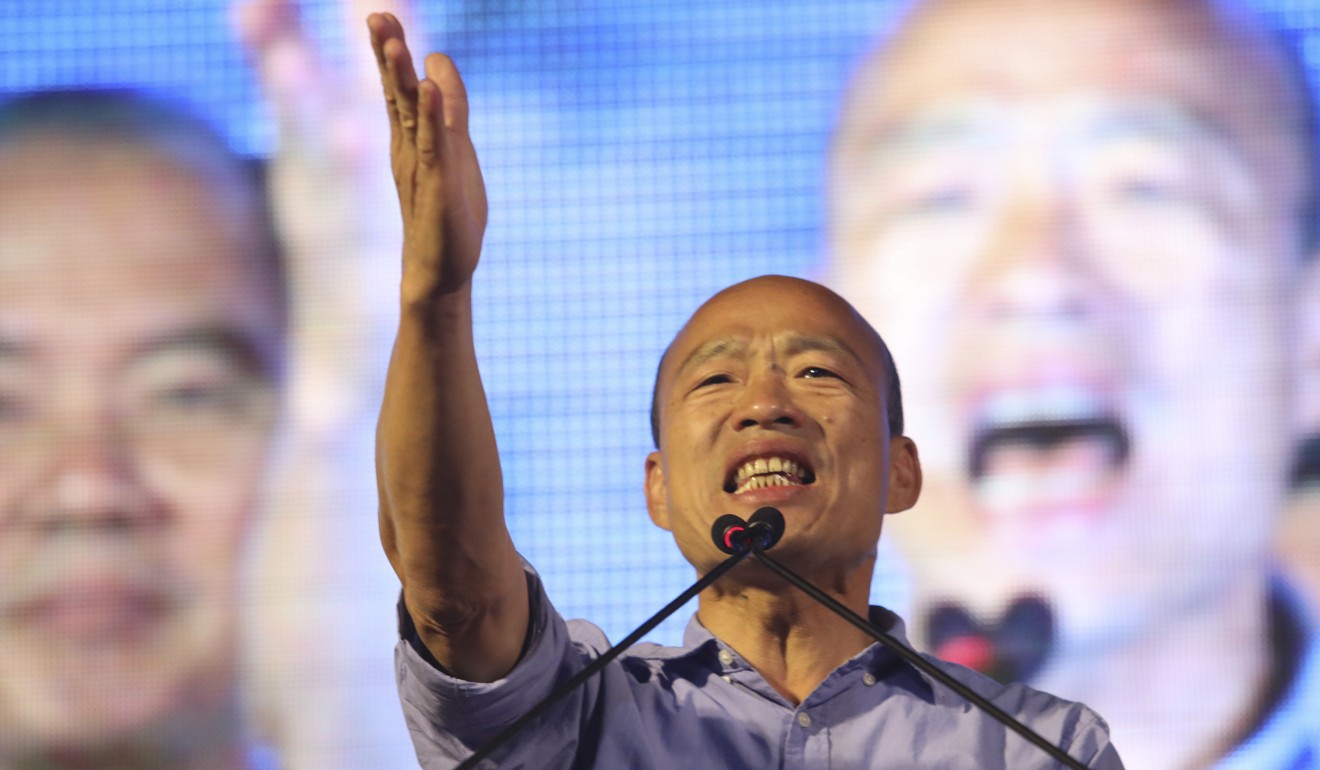
Taiwan’s former premier William Lai refuses to abandon challenge to President Tsai Ing-wen
- Independence supporter insists the Democratic Progressive Party must be allowed to chose its nominee
- Challenger promises Tsai ‘full support’ if she wins nomination for the 2020 presidential contest
Taiwan President Tsai Ing-wen’s reelection bid suffered a fresh blow on Tuesday when former premier William Lai Ching-te refused to abandon his challenge.
Lai, an outspoken supporter of independence, rejected her plea for cooperation and insisted the ruling Democratic Progressive Party must choose its candidate for next year’s presidential elections in a primary.
“If President Tsai wins the primary, I will give her my full support,” Lai said. “[If I were to win,] I would hope she would support me.”
Lai blindsided Tsai and her administration and shocked the party faithful earlier this year by announcing he would challenge his former boss for the nomination, ensuring the island’s tense relationship with the mainland will be a central focus of the campaign.
The former mayor of the southern Taiwanese city of Tainan had stepped down in January, weeks after a humiliating local election defeat for Tsai’s DPP.
His defiant remarks contrasted with the more conciliatory tone set by Tsai, who said at a separate media conference on Tuesday that she would be willing to team up with Lai, if it would boost the party’s chances of holding on to power. Numerous opinion polls show Tsai is struggling to retain support, while Lai’s standing is rising.
The candidates could make their cases to be the party’s nominee publicly this weekend, after an effort by a “mediation group” to move things forward failed to clarify who the nominee would be.
Lai heaped scorn on the idea of forming a joint ticket with Tsai.
"When there is no final decision on who will represent the party to run, it is premature to say who should team up with who,”he said. "I want to run for the post because I can sense the difficulties the DPP is encountering and the challenges Taiwan is facing.
“I want to take over the burden not because of myself, but because of my sense of mission."
Lai’s actions have prompted some within the party to propose the DPP hold an extraordinary congress to change the existing primary rules or even revoke them, to ensure Tsai gets to run for a second term as the DPP’s standard bearer. No Taiwanese president seeking re-election has ever had to fight a primary.
The DPP has yet to act on the suggestion, presumably fearing that doing so would sow further party disunity.
"It is inappropriate for someone to say that primaries would lead to defeat in the elections,” Lai said. “There were many factors affecting the elections. The DPP did not win in 2008 and 2012 – not just because of the primaries."

Tsai, perhaps sensing her political chances slipping away, attempted to shift the focus onto party unity.
At a hastily arranged news conference she said the DPP’s priority must be to find the best path to victory in the upcoming election.
“I am the incumbent, and the DPP is the ruling party, not the opposition party,” Tsai said. “How the ruling party deals with the primary election certainly would impact on the operations of the government and future of the party.”
If the DPP’s attempts at mediation fail, both candidates will be given the opportunity to present their case to the public over the weekend.
The party is then due to hold a poll between April 15 and 17 and the winner will be announced on April 24.

Notwithstanding her stated intention to seek a second term as president, Tsai’s future has been in question ever since the DPP’s resounding defeat in last year’s local elections.
She urged party members to mind the costs of disunity, saying that internal divisions in previous campaigns had hurt the DPP at the polls.
Achieving her personal mission, she said, was not as important as ensuring a good future for the people of Taiwan.
When Lai’s unprecedented entry into the primary opened a rift in the DPP, a five-person party mediation group aimed to help the two politicians find common ground.
At the group’s urging, Tsai and Lai met on Monday. But the get-together produced little tangible result as neither refused to give ground.
Lai, 59, who calls himself a “practical pro-independence worker”, has strong support from the hardline pro-independence camp.
Tsai has been under fire from that faction, which questions her pro-independence credentials.
Tensions between the self-governed island and the main Chinese government have escalated since Tsai’s election.
Beijing considers Taiwan a wayward province subject to eventual union, by force if necessary.
But the unpopularity of Tsai’s domestic policies has been blamed for the DPP’s humiliating election defeat on November 29, costing the party even the pro-independence stronghold of Kaohsiung in southern Taiwan.
According to numerous polls, Tsai is viewed unfavourably in comparison with the winner of that election, Han Kuo-yu, from the opposition Kuomintang party.
Tsai also fares negatively in comparison with Taipei’s independent mayor Ko Wen-je and the KMT’s former mayor of New Taipei Eric Chu.
But the polls suggest that a presidential contest including both the president and Lai against either Han or Ko would be too close to call.

